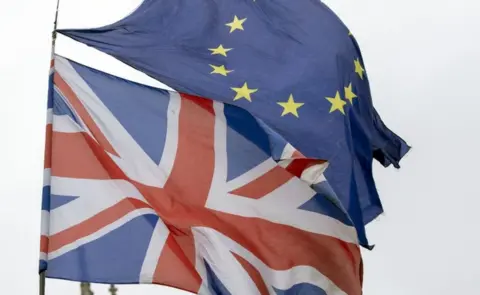Brexit: EU says window to resolve NI part of deal rapidly closing
 Steve Parsons/PA Wire
Steve Parsons/PA WireThe "window of opportunity" for the UK and EU to resolve how to implement the NI part of the Brexit deal is "rapidly closing," the EU has said.
A joint UK-EU committee held its third meeting on Monday.
The Stormont Executive's junior ministers Gordon Lyons and Declan Kearney took part by video conference.
The meeting came at the start of the latest round of talks about the UK's future relationship with the EU.
European Commission Vice-President Maroš Šefčovič said he had reiterated the "urgent need" for the UK and EU to accelerate their work in the coming weeks.
"Many difficult issues remain and the UK position is far apart from what the EU can accept," he told a press conference in Brussels after the meeting.
Mr Šefčovič said the two sides also remain at odds on whether NI businesses will be required to complete a piece of administration known as exit summary declaration forms for goods going to the rest of the UK.
The prime minister has repeatedly promised no new paperwork for trade moving from NI-GB.
Cabinet Office Minister Michael Gove is in Brussels for the talks about the UK's future relationship with the European Union.
The Brexit deal, which was agreed in October, treats Northern Ireland differently from other parts of the UK through what is known as the Northern Ireland protocol.

What is the Northern Ireland Protocol?
The Northern Ireland Protocol is designed to prevent a hard border in Ireland - or any new checks at the Irish border.
It does this by effectively keeping Northern Ireland in the EU's single market for goods.
This will mean products entering Northern Ireland from the rest of the UK will be subject to new checks and control - the so-called Irish Sea border.
However, the precise nature of these checks needs to be agreed by the EU and UK and are being negotiated in parallel with the trade talks, which Prime Minister Boris Johnson wants concluded by the next European Council meeting on 15 October.
But the UK and EU have been engaged through the joint committee to work out the nature and extent of the checks on goods after the transition period.
The protocol is due to come into force on 1 January 2021 - the first day of the new EU-UK relationship.

The last set of talks between the two sides ended acrimoniously when the UK government introduced the Internal Market Bill to Parliament.
The bill would give UK ministers the power to reduce the amount of paperwork that Northern Ireland firms have to fill in on goods bound for Great Britain, or to remove the need for them entirely.
It would also allow the UK to narrow the scope of EU state aid rules in Northern Ireland.
It is controversial because it would change the terms of the Northern Ireland Protocol, a crucial part of the legally-binding Withdrawal Agreement agreed by both sides prior to the UK's exit from the EU.
The bill has not been withdrawn and is set to be debated by MPs on Tuesday.
Mr Šefčovič said he had also repeated the EU's demand for the UK to withdraw the legislation.
Democratic Unionist Party (DUP) Junior Minister Gordon Lyons, who took part on behalf of First Minister Arlene Foster, said he had "emphasised the importance of the UK internal market and the need to secure a deal that works for businesses, citizens and consumers in Northern Ireland".
Allow X content?

Sinn Féin's Junior Minister Declan Kearney took the place of Deputy First Minister Michelle O'Neill, who it is understood could not take part in the meeting due to illness.
Mr Kearney said he had made clear to the committee that Downing Street's Internal Market Bill - which would allow the UK to override parts of the original Brexit deal relating to NI - "does not command the support of the majority of political parties in Ireland, north or south".
Allow X content?

He insisted that the Northern Ireland protocol must be "fully implemented".
Formal UK-EU negotiations will also resume on Tuesday as the two sides attempt to agree a post-Brexit trade deal.
Last week, the UK said a lot of work remains before a deal can be reached.
Trader Support Service
Businesses in Northern Ireland can now sign up to the system to help them deal with the new Irish Sea Border.
The Trader Support Service (TSS) will effectively see the government paying customs agents on behalf of businesses.
It is required as a consequence of the Northern Ireland part of the Brexit deal.
From 1 January, goods entering Northern Ireland from Great Britain will need customs declarations.
The government had said up to £355m is to be spent on the system - but businesses could not access it until now.
